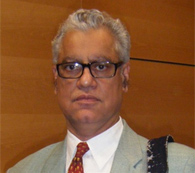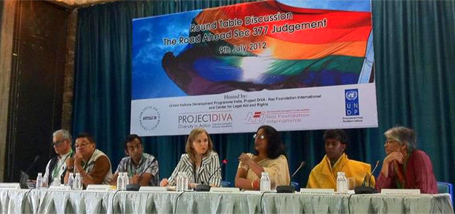Keep the powder dry and be prepared for the worst! That about sums up the round table discussion which was organised by the United Nations Development Programme (UNDP) India in alliance with Naz Foundation International ‘Project DIVA’ and ‘Section 39’ – Center for Legal Aid and Rights, the Global Fund MSM project and Indian Legal Aid Initiative respectively in Delhi on July 9.
The panel featured Aradhana Johri (NACO), Anand Grover (Lawyers Collective) and Ashok Row Kavi (Humsafar Trust) among others, and the discussion was around the various possibilities thrown up by the Supreme Court hearings challenging the Delhi High Court (DHC) Judgment on July 2, 2009, that over-turned and read down the anti-sodomy law, Section 377 of the IPC.

Anand Grover from the Lawyers Collective, the lawyers’ NGO that argued the case in both the Delhi High Court and now fighting over 20 Special Leave petitions in the Supreme Court said: “The Judges on the bench hearing this challenge to the DHC did not seem happy with the Delhi High Court judgment. They ridiculed the Health Ministry’s affidavit that supported decriminalisation of same-sex relations which prevented access to them for providing them health facilities”.
“Besides, the good judges did not seem to connect the gay community to sodomy at all. They seemed to imply that ‘everybody’ was practicing it (which is right). What they implied is that Section 377 had nothing to do with HIV and secondly, nothing at all to connect it to the gay community,” Grover added.
However, said Grover, “the good judges cannot do much regarding the sound DHC judgment” because it is based on a firm foundation of Constitutional morality which is difficult to overturn as it is supported by the Fundamental Rights in the Constitution of India; like the fundamental right to equality, privacy and dignity. “This generic equality law as enunciated in the DHC cannot be overturned except by re-writing the Indian Constitution”.
He also said that even his opponents said “the time has come to overturn this silly anti-sodomy law that is at variance with any modern country”. He seemed surprised that even the most stubborn religious guys were saying that to him in private. He said the law had essentially little to do with homosexuality but more to do with an individual’s right to be himself.
Arvind Narain, director of the Alternative Law Forum (ALF), said the important aspect of this law was the stress on equality and freedom as enshrined in the Indian Constitution that would now be extended to many underprivileged and oppressed segments of the Indian population. Narain said Dalits, Muslims, Women and many ethnic minorities will find that this judgment defines the concept of private space and autonomy which has never been part of the legal discourse in India.
Narain said that movement against Section 377 brought in massive mobilisation of sexual minorities and that this must never be allowed to lose sight of or momentum in the future. His discourse talked of the broadening out of the movement to other sections of the Indian citizenry that required empowerment and the help of the DHC to rise up and claim their citizens’ entitlements like ration cards, ID cards, right to education and food. He said it was important to build broader coalitions so the very idea of freedom became a reality as the Constitution envisaged. The ALF fought in the Supreme Court for a broad alliance of LGBT groups, Voices Against 377, on grounds of the right to sexual orientation and gender identity (SOGI) and stressed the principles enshrined in the Yogyakarta Law Commission which stressed that gender identities were also a fundamental human right.
Ashok Row Kavi, convener of the Integrated Network for Sexual Minorities (INFOSEM), traced a broad overview of how gay activists in India had worked over three decades starting in 1990 to develop and start a unified movement by mobilising all kinds of sexual minorities like gay men, lesbians, bisexuals and transgendered persons with wide and diverse special issues into a consolidated movement with a unified message.
The first message was to decriminalise same-sex relations as they were criminalised in Section 377. This central peg was used to mobilise a wide range of communities, some not even being threatened by that penal provision, like the lesbians. This had been achieved by constant discussions, debates and also movements taking on board feminist issues of patriarchy and heteronormativity. It had not just strengthened but intensified the intellectual content of the movement.
He mentioned the close door consultation that his organisation, the Humsafar Trust, had held way back in May 2001, and titled "Looking into the Next Millennium" which trashed out the major issues facing homosexuals and transgendered persons in Asia, specially India, and said the road map still remains intact in the way the consultation brought 177 gay men, lesbians, bisexuals and transgendered persons from 32 groups together and today represented over 140 MSM, lesbian, bisexual and transgendered groups together in INFOSEM.
He explained how INFOSEM started engaging different gate-keepers within the government and political class, from police associations, judges and magistrates, parents and teachers associations, trade unions and bureaucrats and of course, politicians. He said the culmination of this engagement was how the Health Ministry took the complete strategic plan for health delivery systems for gay men from INFOSEM and printed it as an annexature in its own HIV prevention strategic planning document in 2005. Not only was it a victory but it quietly created history that a government which first did not even accept that a gay community existed in India finally took on board its strategic plan to work with them into its own planning documents. Row Kavi congratulated the hundreds of LGBT activists who made that possible at every stage.
He also thanked Government representatives at the panel discussions for having listened to LGBT activists and finally co-opting them into the system. He said last year, the government had requested a working group of gay men and transgendered persons to draw up the strategic plan to work with the communities and handed it to the Health Ministry and thus to Parliament. He said from just 30 targeted interventions reaching hardly 30,000 gay men, the Indian government today reached out to over 400,000 homosexuals in over 200 direct interventions and 200 “composite interventions” for risk groups like gay men, IDUsers, and sex workers.
Akkai from Sangama stressed the issues of transgendered persons whereas Maya Sharma poignantly brought out the issues of lesbians and transgendered female to male persons on board.
In 2001, police raided two HIV NGOS who worked with gay men and MSMs in Lucknow, India and arrested four workers. They were beaten publicly, charged under section 377 of the Indian Penal Code and jailed for 47 days. This video explains the story of why and how activists (including Anand Grover who led the Naz Foundation's legal case for the repeal of Section 377) lobbied to get the law banning homosexuality in India – Section 377 – overturned.












 Printable Version
Printable Version














Reader's Comments
Please log in to use this feature.